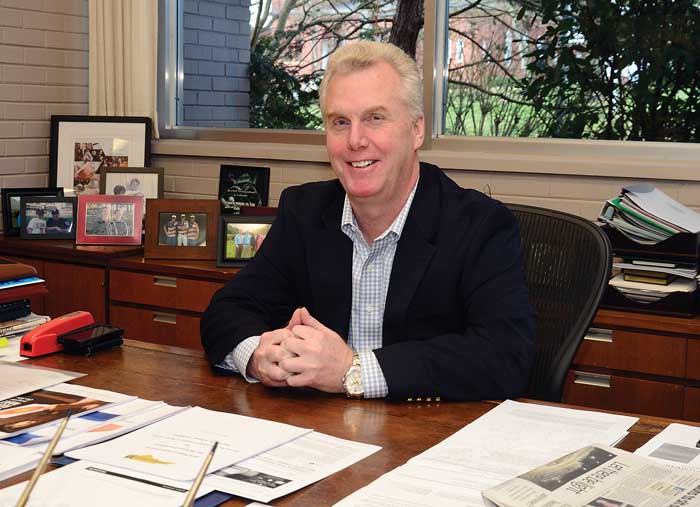Mebane Foundation sticks with founder’s goal
Published 9:44 am Thursday, March 23, 2017

- Mebane Foundation's Larry Colbourne says the foundation has more in store for Davie County young readers.
G. Allen Mebane IV saw the problem early on in his career.
At his first textile company in Alamance County, he had good people as employees. They were able and ready to work.
Trending
But there was one problem.
Many of them couldn’t read.
Mebane didn’t fire them. He started a program to teach them to read.
“He knew if you can’t read, your back is against the wall before you get started,” said Larry Colbourne, president of the Mebane Charitable Foundation.
Mebane went on to make a fortune in the textile industry, building Unifi into a worldwide textile powerhouse. But he never forgot about that first plant – and those first workers.
In 1997 he started the foundation with one primary goal – to have children reading at grade level by the third grade. Studies had shown that children behind grade level at that age had trouble catching up.
Trending
In 2001, Mebane injected $21 million into the foundation. At his death in 2008, another $20 million was added.
With a few sidesteps here and there, the foundation is still focused on improving the skills of the youngest readers. They do it in private and public schools, in charter schools, wherever the board of directors thinks the programs can do the most good.
They’ve been especially active in Davie County. Mebane lived near Mocksville and opened the foundation here on South Main Street. It’s the building downtown with the well kept landscaping. Mebane wanted it that way, Colbourne said.
And although Mebane has been gone for nearly nine years, Colbourne still feels his presence. And he remains dedicated to the same cause that Mebane championed.
“We know we’re doing good things,” Colbourne said. “We’ve seen growth in reading scores. Ultimately, the goal is to meet the literary needs in a school system or a school.”
The focus is changing somewhat. In the past, much of the foundation’s efforts have been to help struggling readers. The new focus, Colbourne said, is to help all young people as they start their reading journey.
The foundation has partnered with The Hill Center in Durham, which started innovative ways to teach reading. Davie County has been at the forefront of the efforts, training teachers in Hill Center methods.
The foundation has also helped fund new pre-schools in Davie elementary schools. It helped pay for technology upgrades. It helped pay for a place for student teachers to live while teaching here.
The list goes on, and according to Colbourne, it isn’t over. The Mebane Foundation has ideas to help Davie students even more.
“The Davie County School System does a great job, with a great return on money. I’ve been across the state, and Davie County is in a great place now. The only way to go is up. For a return on investments, Davie County is No. 1.”
Colbourne spends his time visiting schools, talking to teachers, administrators and experts, attending conferences and board meetings, always on the lookout for a suitable project for the foundation.
“I network and try to find good partners,” he said. “Once we get a partner … I’m constantly talking to potention grantees or to grantees.
The foundation has focused on programs in North Carolina, but has gone to other states, as well. Ideally, projects the foundation helps to start would become so important, the local schools would keep them going when the foundation goes to another site.
There are 150 kids in a Mebane sponsored preK program in Davie County. Some 90 percent are tested ready for kindergarten. That number drops to 40 percent average in private daycares. Part of the new focus will be ways to help those children.
Schools are important to Colbourne, who moved to Davie County in 1996. He and wife Beverly moved here because of the good reputation of the school system. They raised sons Craig and Darren here. Both are in college.
The road to the Mebane Foundation was a long one for Colbourne, who grew up in New Foundland, Canada. He had graduated high school and had no real plans. He did, like many of his fellow New Foundlanders, enjoy playing baseball. The season there is short, but just about everybody plays.
He was 21 when a friend called him and told him to move to Ft. Lauderdale, Fla., because he could get him a job as a valet parking cars.
Colbourne made the move in 1986. He met the baseball coach at Broward Community College, who gave him a scholarship to pitch for the team. Wake Forest University spotted the pitcher from Canada, and offered him a scholarship to go there.
He realizes, and appreciates, how lucky he’s been since moving to Ft. Lauderdale.
He graduated from Wake Forest with a degree in speech communications, and got a job in the credit department at Wachovia Bank. When it was sold, he could either move to Charlotte for a different job with the new bank, or be unemployed.
Since a severence package was offered, he chose the latter. He also took the advice of a friend, who said to volunteer, do something he wanted to do.
He volunteered at the Winston-Salem Industries for the Blind. It wasn’t long before that group had him out raising money.
Colbourne came to Mocksville to ask Allen Mebane for a donation.
He didn’t get any money, the foundation’s priority was early reading. But a short time later, Mebane called him in and offered him a job at the foundation. The deal was sealed on the back of a piece of paper.
Eighteen months later, Mebane died.
“I worked with Allen Mebane one-on-one for a year and a half,” Colbourne said. “That was the best position. I was so fortunate. He seemed tough, but his heart was in the right place for the right reason. Everything he did, he did it for the right reason.”
The foundation’s office is filled with photos of children served in the programs. Colbourne can point to them, and say how they’ve done in life. One photo of a dozen or so young struggling readers stands out. All of them went on to some type of education beyond high school, he said.
“I love my job. I’m the luckiest guy in the world.”





